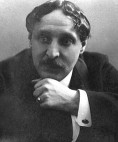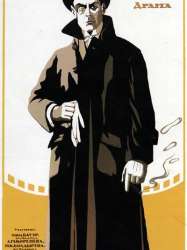Evgueni Bauer is a Director, Scriptwriter and Production Design Russe born on 1 january 1865 at Moscow (Russie)

Yevgeni Franzevich Bauer (Russian: Евгений Францевич Бауэр) (1865 – 22 June 1917) was a Russian film director of silent films, a theatre artist and a screenwriter. His work had a great influence on the aesthetics of Russian cinematography at the beginning of the 20th century.
Bauer made more than seventy films between 1913 and 1917 of which 26 survived. He already used relatively long sequence shots and displacements of camera virtuosos. Los Angeles Times film critic Kenneth Turan called Bauer "The greatest director you've never heard of."
In 1887, Bauer graduated from the Moscow School of Painting, Sculpture and Architecture. He tried out a number of different professions, first working as a caricaturist, drawing satirical sketches for the press. He then became a master of art photography, before moving to work in the theatre, as a producer, an impresario, and a professional set designer. In the 1890s he married the actress and dancer Lina Ancharovna, whose surname he used during the First World War when he went under the pseudonym of Evgeni Ancharov, feeling that his own surname was "too German".
Even in these early years, Bauer was attracted to cinematography and started to work as an artistic producer and director. His first work in the cinema was an order for set decorations for the film "300 Years of the House of Romanov" (1913), produced by Alexander Drankov's film company. After this, Bauer worked for Drankov as a producer and made four films. He then made another four films for the Moscow branch of the French company Pathé Brothers, and then finally started to work for the Khanzhonkov company, which at that time was the unspoken leader in Russian cinematography.
From the end of 1913 to the start of 1917, Bauer made more than 80 films, of which less than half remain today. Bauer worked mainly in the genres of social and psychological drama (although he also made comedies), such as Tears, After Death (both 1915), A Life for a Life (1916), and The Revolutionary (1917). He worked with the leading actors of Russian silent cinema, including Ivan Mozzhukhin, Vera Kholodnaya, Vitold Polonsky, Ivan Perestiani, Vera Karalli and others.
In 1917, Bauer and the Khanzhonkov company moved to a new studio in Yalta, where he made the film For Happiness with the young actor Lev Kuleshov. Bauer broke his leg on the set, and had to work on his next film, The King of Paris, from a bathchair. However, Bauer started to suffer from complications relating to pneumonia and could not complete this film. On 22 June 1917, Bauer died in a Yalta hospital. His final film was completed by actress Olga Rakhmanova.
Source : Wikidata
Evgueni Bauer

- Infos
- Photos
- Best films
- Family
- Characters
- Awards
Birth name Yevgeni Frantsevich Bauer
Nationality Russie
Birth 1 january 1865 at Moscow (Russie)
Death 22 june 1917 (at 52 years) at Yalta (Ukraine)
Nationality Russie
Birth 1 january 1865 at Moscow (Russie)
Death 22 june 1917 (at 52 years) at Yalta (Ukraine)
Bauer made more than seventy films between 1913 and 1917 of which 26 survived. He already used relatively long sequence shots and displacements of camera virtuosos. Los Angeles Times film critic Kenneth Turan called Bauer "The greatest director you've never heard of."
Biography
Bauer was born in Moscow in 1865, the son of the Russified Bohemian musician Franz Bauer and his wife, an operatic singer. From childhood, Bauer displayed artistic tendencies, and participated in his favourite dramatised scenes (his sister was a professional actress).In 1887, Bauer graduated from the Moscow School of Painting, Sculpture and Architecture. He tried out a number of different professions, first working as a caricaturist, drawing satirical sketches for the press. He then became a master of art photography, before moving to work in the theatre, as a producer, an impresario, and a professional set designer. In the 1890s he married the actress and dancer Lina Ancharovna, whose surname he used during the First World War when he went under the pseudonym of Evgeni Ancharov, feeling that his own surname was "too German".
Even in these early years, Bauer was attracted to cinematography and started to work as an artistic producer and director. His first work in the cinema was an order for set decorations for the film "300 Years of the House of Romanov" (1913), produced by Alexander Drankov's film company. After this, Bauer worked for Drankov as a producer and made four films. He then made another four films for the Moscow branch of the French company Pathé Brothers, and then finally started to work for the Khanzhonkov company, which at that time was the unspoken leader in Russian cinematography.
From the end of 1913 to the start of 1917, Bauer made more than 80 films, of which less than half remain today. Bauer worked mainly in the genres of social and psychological drama (although he also made comedies), such as Tears, After Death (both 1915), A Life for a Life (1916), and The Revolutionary (1917). He worked with the leading actors of Russian silent cinema, including Ivan Mozzhukhin, Vera Kholodnaya, Vitold Polonsky, Ivan Perestiani, Vera Karalli and others.
In 1917, Bauer and the Khanzhonkov company moved to a new studio in Yalta, where he made the film For Happiness with the young actor Lev Kuleshov. Bauer broke his leg on the set, and had to work on his next film, The King of Paris, from a bathchair. However, Bauer started to suffer from complications relating to pneumonia and could not complete this film. On 22 June 1917, Bauer died in a Yalta hospital. His final film was completed by actress Olga Rakhmanova.
Usually with
Filmography of Evgueni Bauer (6 films)
Director

The King of Paris (1917)
Directed by Evgueni Bauer
Genres Drama
Actors Nikolai Radin, Vera Karalli
Rating60%





In Paris, Raskol takes young Bremond under his protection. He tells him that if he treats women as slaves, men as enemies and businessmen as puppets, he will become King of Paris. The two men, now passing as Count de Saint-Venkov and Marquis de Predamond apply the recipe very successfully. However, when Bremond wants to marry the Duchess von Dorstein for her money, he will have to confront her son, who has changed his name to Jean Hiénard and lives a simple life as a sculptor.

Daydreams (1915)
, 37minutesDirected by Evgueni Bauer
Genres Drama
Rating66%





Sergei is devastated by the death of his beloved wife Yelena. He becomes more and more obsessed by her and more and more often sees visions of her ghost. He starts an affair with an actress who looks like his dead wife but progressively drifts into madness with dramatic consequences.

Her Heroic Feat (1914)
Directed by Evgueni Bauer
Genres Comedy
Actors Ivan Mosjoukine
Il y a vingt ans que, dans sa jeunesse, Madame Moskina a accompli un exploit héroïque : elle a poignardé avec un couteau à dessert le bougre qui a tenté de l'embrasser. Pour ce fait, elle a reçu une couronne de laurier et une mention élogieuse de la Société pour la protection de la vertu. Elle a accroché ses distinctions, avec le couteau, au mur de son salon. Depuis lors, tous la craignent, les travailleurs, sa nièce Lisa et son mari qui, soumis, est régulièrement enfermé dans un placard. Mais le mari fidèle se révolte soudainement la vingt et unième année quand la charmante voisine Clorinda, une ancienne danseuse, conquiert son cœur. Apprenant sa présence dans la maison, Moskine choisi de sortir de son placard. Il se jette à genoux devant sa déesse. Quand sa femme en colère lui intime l'ordre de réintégrer son lieu de détention, il décide de s'enfuir, poursuivi par sa femme. L'exubérante Clorinda lance alors un pot de fleurs par la fenêtre, au moment de leur passage. La police envahit l'appartement de Clorinda et Moskine, terrifié, décide de feindre la folie.

Child of the Big City (1914)
, 37minutesDirected by Evgueni Bauer
Origin Russie
Genres Drama
Rating65%





Manetschka, jeune couturière, vit depuis son enfance dans la misère, et cherche à s'en sortir. Elle rencontre par hasard Viktor, jeune homme, lui, à la recherche d'un amour pur.

Life in Death (1914)
Directed by Evgueni Bauer
Origin Russie
Genres Drama, Horror
Actors Ivan Mosjoukine
Pour sauvegarder la beauté de sa femme, le Dr Renaud la tue et embaume son cadavre.

Silent Witnesses (1914)
Directed by Evgueni Bauer
Genres Drama
Actors andreï Gromov
Rating57%





When Variusha, a maid in a Russian upper-class household, is not allowed to go and see her children in the country, the porter's granddaughter Nastya agrees to replace her. Soon she attracts the attention of Pavel, the son of the house, who starts flirting with her. When Nastya finds out that Yelena, Pavel's fiancée, has a lover, she tries to chase him away and refuses the money offered to her to remain silent. But Pavel does not want to endanger the wedding arranged for him. He has lost interest in Nastya and treats her only as a maid.
Scriptwriter

The King of Paris (1917)
Directed by Evgueni Bauer
Genres Drama
Actors Nikolai Radin, Vera Karalli
Rating60%





In Paris, Raskol takes young Bremond under his protection. He tells him that if he treats women as slaves, men as enemies and businessmen as puppets, he will become King of Paris. The two men, now passing as Count de Saint-Venkov and Marquis de Predamond apply the recipe very successfully. However, when Bremond wants to marry the Duchess von Dorstein for her money, he will have to confront her son, who has changed his name to Jean Hiénard and lives a simple life as a sculptor.

Child of the Big City (1914)
, 37minutesDirected by Evgueni Bauer
Origin Russie
Genres Drama
Roles Writer
Rating65%





Manetschka, jeune couturière, vit depuis son enfance dans la misère, et cherche à s'en sortir. Elle rencontre par hasard Viktor, jeune homme, lui, à la recherche d'un amour pur.
Art

Child of the Big City (1914)
, 37minutesDirected by Evgueni Bauer
Origin Russie
Genres Drama
Roles Production Design
Rating65%





Manetschka, jeune couturière, vit depuis son enfance dans la misère, et cherche à s'en sortir. Elle rencontre par hasard Viktor, jeune homme, lui, à la recherche d'un amour pur.
 Connection
Connection




